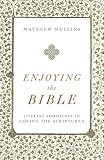The Bible has much to say about its own purpose and authority. Among the most famous passages in this vein is 2 Timothy 3:16–17, where Paul writes, “All Scripture is God-breathed and is useful for teaching, rebuking, correcting and training in righteousness, so that the servant of God may be thoroughly equipped for every good work.”
For Matthew Mullins, associate professor of English and history of ideas at Southeastern Baptist Theological Seminary, verses like these are indispensable guides for how believers should read God’s Word. But the trouble comes, he argues, from an overly narrow conception of words like teaching, rebuking, correcting, and training that can tempt us to treat the Bible purely as an instruction manual for what to believe and how to behave.
In Enjoying the Bible: Literary Approaches to Loving the Scriptures, Mullins shows how the Bible’s method of instruction touches both the head and the heart. It works, in other words, much like poetry and other types of literature, informing our minds and stirring our emotions in ways that can’t be completely untangled. Jessica Hooten Wilson, an author and University of Dallas scholar specializing in theology and literature, spoke with Mullins about poetry as a gateway to greater enjoyment of God and his Word.
Who are you hoping to reach with this book?
I’m trying to reach anyone who might say, “I want to pick up this ancient, diverse, awesome text and enjoy my reading of it.” I’m writing to my Christian evangelical students and friends—people who, like myself, tend to think of the purpose of Scripture in a way that privileges information and instruction above enjoyment.
And if I’m being honest, I’m also writing the book to myself, as someone who, on a visceral level, enjoys bingeing on Netflix more than digging into the Bible. I look forward to the newest album from my favorite band more than I look forward to reading the Gospels. I know it’s not supposed to be that way, but it is. So writing this book was also a spiritual exercise.
You use the word enjoy in your book title. What do you mean by “enjoying” the Bible—can you enjoy it in the same way you enjoy Netflix?
My original title for the book was along the lines of, “You can’t understand the Bible if you don’t love poetry.” It was a bit more polemical than where we ultimately settled. But on a basic level, by “enjoying” the Bible, I mean something quite like taking pleasure in it. My conviction, however, isn’t that we should enjoy the Bible as an end in itself. Ideally, by learning to enjoy it, we cultivate a greater enjoyment of God himself.
Why do you suppose so many believers have a hard time taking pleasure in reading Scripture?
Like me, most of my students were raised in churches that hold the Bible in extremely high regard. In part, this is because we like to believe it can act like an instruction manual, giving practical guidance on what we’re supposed to do in life: Am I supposed to go to college? Am I supposed to go to this church or that church? Am I supposed to marry this person or that person? When you’re going through the Bible just looking for answers to those kinds of questions, that’s going to rob you of your joy in reading. You’ll constantly be anxious about whether you’re reading it the right way.
In my introduction, I talk about how we tend to think of the Bible as this unified thing, when in fact it’s this crazily diverse collection of genres and literary forms. As a result, we misunderstand how to go about reading it. What I’m trying to do in the book is to change our understanding of what the Bible is—and also to change our understanding of what it would mean to understand it.
If the Bible isn’t an instruction manual, then what sort of book is it? And what sort of approach should we take in reading it?
I would say that the Bible is not only an instruction manual—even when we’re reading some of the most poetic passages in the Wisdom Literature, we can still draw direct instruction from them, at least at times. My point is that if we’re only looking for practical, what-should-I-do-with-my-life lessons, then we’re missing out on a huge dimension of what it means to let these passages instruct us. They’re not just trying to instruct our intellects. They’re also trying to instruct our desires and our emotions. That’s where the literary component comes in.
In my introduction, I use the example of Psalm 119:105: “Your word is a lamp for my feet, a light on my path.” There’s a clear intellectual instruction: that you should consult God’s Word at times of uncertainty. My argument is that if this were the sum total of what the psalm intends to communicate, then it would have done so in straightforward, instructional language. But instead, it uses this amazing poetic, metaphorical language that instills in us the idea of longing.
Being instructed by this text, then, is more than a matter of being trained to know what to do. It’s also a matter of being trained to desire the text itself, which is an essential part of the “instruction” it gives. What I’m trying to do is more radical than saying that the Bible is instruction plus these other things—longing, desire, delight. I’m saying that the Bible’s form of instruction itself always entails these other things.

How can reading poetry train us to read the Bible with this kind of desire and delight?
Our struggle with poetry isn’t just a sign that we don’t know what to do with the Bible. It’s a sign that we don’t always completely understand what kind of creatures we are. The reason poetry is so valuable and effective at retraining our eyes and our reading habits is that it frequently frustrates our desire to reduce what we’ve read to a simple message or a clear instruction.
When I was first studying the poetic parts of the Bible, I hated that element of frustration. But now I welcome it. I think, “Maybe there’s something I’m not seeing right way. Maybe there’s something in my reading and my thinking that needs to change.”
Poems demand more attention than ordinary prose. Every time you return to a poem, there’s always something else—and something else, and something else. If that’s true of a finite human text, it’s even truer of biblical texts that have survived for ages and that continue to radically transform people’s lives.
One of the practices you dwell on is contemplative Bible reading. What do Protestant Christians, who might be unfamiliar with such traditions, have to gain from approaching Scripture in this manner?
I was raised to hold the Bible in high regard. My father held a divinity degree, and he worked in a church. On Sunday mornings, as well as Wednesday and Sunday nights, we listened to the expositional preaching of God’s Word. I went to a Baptist college that was conservative theologically and took the Bible as authoritative. That’s a part of my tradition I hold dear.
And yet, as someone coming from this more conservative evangelical tradition, I’m hoping to provide something like a gateway or baby steps into these more reflective and contemplative practices, like lectio divina. The more we can change the way we think of biblical interpretation, to read Scripture the way we might read poetry, the more we’ll be able to contemplate its beauty and feel its pull on our emotions, rather than just mining it for instruction.
This has the added effect of loosening our grip on certainty, ever so slightly, and making us more humble readers—even as we remain fully committed to the Bible’s authority.
If the Bible should touch our emotions when we read, then how can we know whether those emotions are trustworthy? Isn’t it possible they could distort rather than sharpen our understanding?
I certainly don’t want to claim that emotion is somehow the foundation of understanding. Nor do I believe that the truth is, in some way, a recipe made up of this much emotion plus this much imagination plus this many facts.
That said, I do believe that elements of beauty and emotion come into play as we read the Bible, in specific and practical ways. Whenever we’re reading a work of literature—even the Bible itself—the words on the page appeal to our imaginations. This happens for countless readers across various backgrounds and life experiences.
This, to me, is where truth and beauty come together. Once our imaginations have been fired, we’re able to connect or relate to the literary work in ways that unite feeling and knowledge inseparably. And that’s where true understanding happens.
In modern Christianity, largely through the Enlightenment, we’ve inherited an overly rationalistic framework. I’m pushing back against that. We don’t need to set aside our emotions to understand things. In fact, setting them aside can hinder that very process.
The narrative of Scripture is set in a different time and place than our own. How can poetry and literature help us grapple with the unfamiliar?
One function of poetry and literature is helping us connect across different experiences by inviting us to identify with worlds that are alien to our own.
In the book, I explore the work of Anne Bradstreet, an early Puritan poet. In Bradstreet’s poem The Author to Her Book, she likens the work of writing to the work of being a mother. Even though I’ve never been a mother, I have occasionally experienced something of the vulnerability and self-doubt that Bradstreet describes about her work as both an author and a mother. I can identify with her, then, even though our experiences might be dramatically different. Good literature creates an atmosphere that fosters these kinds of connections across time and place.
It’s important to caution that perfect empathy—seeing the world from someone else’s point of view in a full and complete way—is impossible. And attempting to identify with someone across broadly divergent experiences can sometimes lead us to draw false equivalences. But literature still has great power to inform our imaginations about unfamiliar things.
If you could leave your readers with one takeaway, what would it be?
If I could have one desired outcome, it’s that people reading this book would experience a different mode of reading the Bible. What I’ve found in my teaching experience is that poetry and literature can make us better Bible readers.
But that’s not the endpoint. Being better Bible readers makes us better lovers of God—and, in turn, better lovers of our neighbors.












